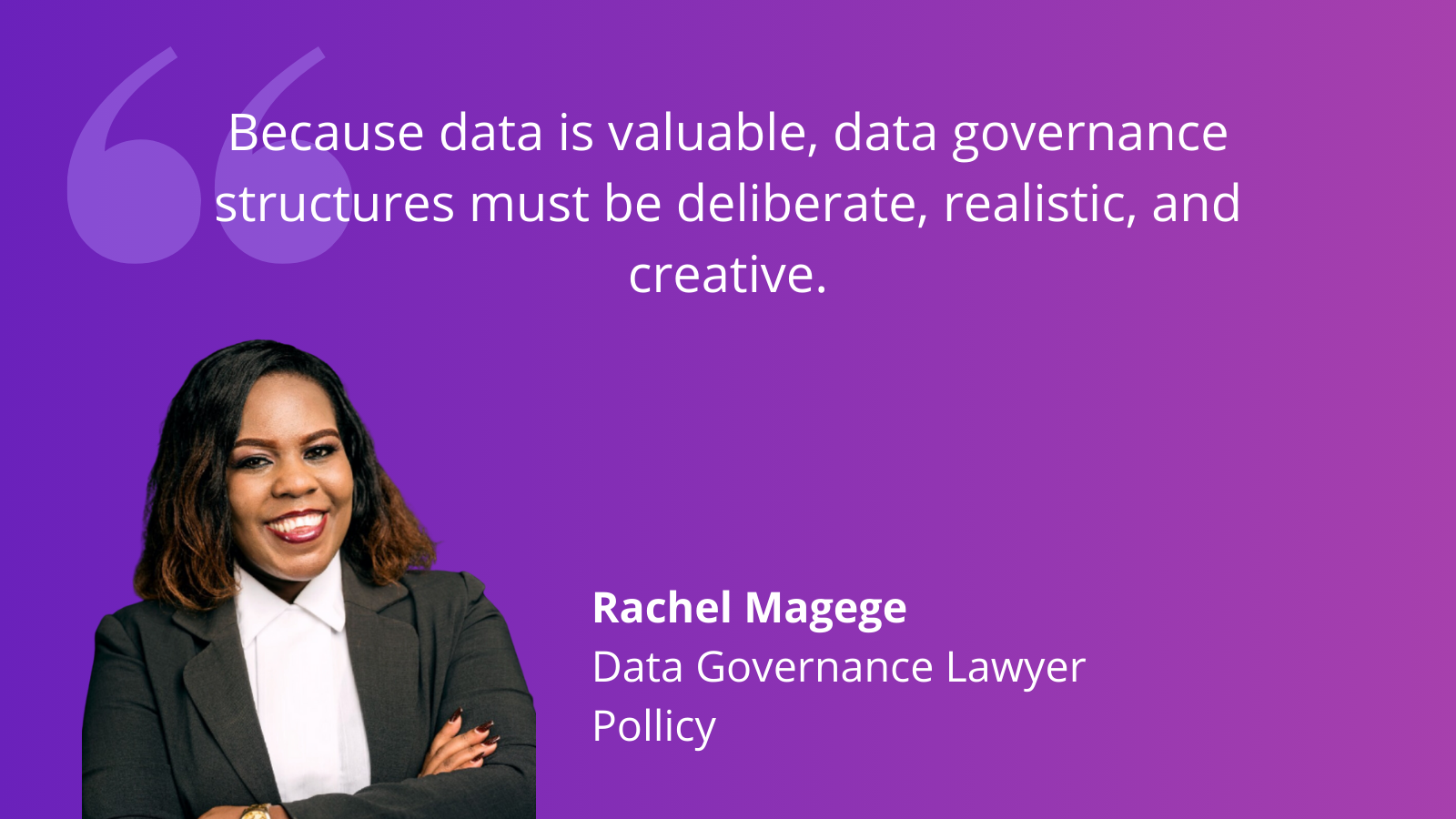This blog is part of a series from the Datasphere Initiative’s Africa Forum on Sandboxes for Data. The Datasphere Initiative is asking data policymakers and shapers across the region why Africa needs to responsibly unlock the value of data for all and how sandboxes might help catalyze ideas into action. Read more about the Africa Forum here and the blog series here.
Rachel Magege, Data Governance Lawyer, Pollicy.
Data is a precious commodity, which has different actors, regulators, and institutions actively working to govern it. Unlocking the value of data ensures that all data subjects understand what private information they possess (about themselves), and how to protect and safeguard it. Moreover, it ensures that technologies are sensitive to this data, how to collect and use it responsibly, and how to make sure data subjects also benefit from their personal information as stipulated in The Personal Data Protection Act of Tanzania, No. 11 of 2022 – as an example of good provisions.
Because data is valuable, data governance structures must be deliberate, realistic, and creative. Although data governance has been defined as complex and still new for Africa, several efforts and strides are emerging every day and the continent is opening itself up to formulating better laws, embracing advanced technologies, and supporting key actors in the digital and tech space.
In this respect, there is a great opportunity for civic tech organizations to provide education and awareness on the value of data. Specifically, there is a massive potential to educate civilians on what data they possess, how to access it, and for purposes of preservation, how to generate digital archives and security for their personal information. The last component is highly important as the digital universe tends to lack sufficient African data, specifically African women’s data. At Pollicy, we found that gender data remains understudied and underutilized, often enveloped in the general scope of data. One of our previous research studies was conducted in collaboration with My Data Rights on Afrofeminist Data Futures, which included a white paper titled What Is an Ideal Internet to You? A Global Exploration of Digital Rights Trends. In this study, readers are able to uncover a lack of inaccessible gender data collection, use, and protection. As such, the value of data remains unknown and can negatively impact policymaking, social services, and infrastructure design.
By educating the masses on the value of their data and increasing its numbers and presence in the digital space, not only will make the internet more diverse but also ensure that Artificial Intelligence is easily trained to pick up more accurate information about Africa. To put ideas into practice, the United Republic of Tanzania was highly commended for recently launching its new Digital Archive, an initiative that started with celebrating the life and work of Dr. Salim Ahmed Salim – a renowned statesman, diplomat, and Pan-Africanist.
Challenges are bound to exist. For data governance, digital skilling has yet to be adequately applied. This involves digital literacy, digital security awareness, privacy matters, and an understanding of respective legal frameworks. Two and specifically for AI deployment, there poses a high risk of intellectual property violation where it is becoming essentially important to distinguish between an AI creation and a human creation. Data is valuable because it is also a form of copyright. If not properly governed, it may yield unfounded results to the detriment of the creator, regulator, or the data subject.
One of the best ways to enforce data governance is by utilizing sandboxes for responsible AI development and application in Africa. This means creating unique machines, platforms, and frameworks that will test the efficiency of AI for data governance in Africa. For maximum effect, these sandboxes must be locally constructed and contextualized and undergo continuous updates and amendments to keep up with evolving technologies.
You can learn more about data governance through our ongoing project named Afro Feminist Data Governance, implemented in Kenya, Zambia, Ghana, and Ivory Coast. We were drawn to create this project in order to repurpose a better understanding of data use for stakeholders and data subjects. We remain excited about the power of harnessing African-made products and designs that allow for local possession of one’s data. For more information, please visit our website here.
- Read more from other contributors in this blog series here
- Read more about the Africa Forum on Sandboxes here
- The Datasphere Initiative has launched a complete online learning experience: “A Guide to Cross-Border Sandboxes for Data.” Enroll for the online course here.
Rachel Magege is a lawyer experienced in data governance, legal research, legislative comparative analysis, investment law, alternative dispute resolution (ADR), and digital and tech law.
She offers legal services locally in Tanzania and regionally in Africa, as well as manages project implementation at a technology consulting and development firm that works to harness ways through which Africans can take back control of their data and reimagine new ways of tech ownership. Rachel is well-versed in legal authorship, and public speaking, and is a developing expert in mediation and arbitration. Aside from the legal profession, she also serves as a Judge and Coach under the International Law Student Association (ILSA) for international legal moot court competitions.
Rachel is a member of the Association of Young Arbitrators in Africa and the Tanzania Privacy Professional Association, and she is optimistic about the future of Africa in her legal advancements and growing her economic and digital competence.



